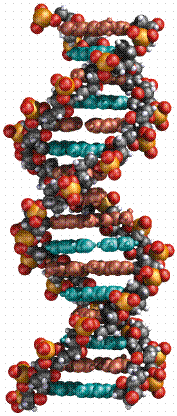|
The Science of Genetics and Ethical Issues Teacher Page A WebQuest for 9th- 12th Grade Biology Designed by
Introduction | Learners | Standards | Process | Resources | Evaluation | Conclusion | Credits | Student Page
This lesson introduces some of the ethical issues surrounding DNA research to high school students. Students will use the Internet to explore these issues. (This is a guided search, and web sites are already provided to the student.) In addition, student will process what they learn and formulate their own opinion. Using examples they find on the Web, students will support and defend their position in writing.
To complete the lesson students should have a basic understanding of genes and the mechanisms of heredity. They should be familiar with the basic vocabulary of genetics and fertilization (i.e. genes, replication, chromosome, zygote, nucleus, pedigree). This will facilitate better understanding of the web sites provided. Knowledge of a web browser is also helpful, although students may be able to learn to use the browser as they are completing the assignment. Curriculum Standards
Biological Standard Addressed: Investigation and Experimentation 1 m. Investigate a science based societal issue by researching literature, analyzing data, and communicating the findings. (eg. cloning)
1) Read over all the web sites listed for all the topics. Yes, this will take you some time, so plan ahead. Get a general idea about each topic. You do not need to follow and read every link each site provides. Explore the sites well enough to decide if you support or do not support research in that area. 2) Decide if you agree or disagree with the King's "zero gene policy". 3) Choose three topics to use to support your position. Delve deeper into these topics using the sites provided and educate yourself on the topic more thoroughly. Follow links and explore as necessary. 4) Write a letter (2-3 pages) to King Timothy
Flugeltoast. Explain to the new King how you feel. Tell him you support/do
not support the new "zero gene policy", and explain why you feel
this way. Use the three topics you chose to support your argument. Your
letter should be well organized, clearly written and persuasive. Include
examples and explanations wherever necessary to get your point across.
This project can be given to students during class and can be completed either at school or at home. Investigating the sites should take up the bulk of the student's time. Writing the letter is the final culmination of what he/she has learned. Teacher's should be aware that some students have access to the Internet at home while their classmates do not. This gives the student with Internet access at home more time to read and understand the sites. The teacher should make sure all students have time to access these sites and keep this computer inequality in mind when grading. This lesson is easy enough
for the novice biology teacher. The teacher should be able to navigate
using a browser and be able to help students as necessary with computer
use. It is highly recommended that the teacher read over the web sites
listed so that he/she is familiar with the content of each site.
One teacher can implement this lesson easily. A computer aide may be helpful to the students as well, but it may not be necessary.
Student Site
Discovery Clip Art Gallery
J. Downey Last updated on Dec 5, 2001. Based on a template from The WebQuest Page |
|
